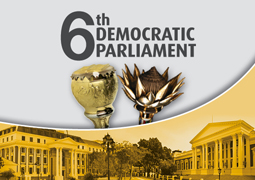
Singing of the national anthem led by the parliamentary choir has been a shining and remarkable trademark of the establishment of both Houses of the 6th Parliament. Like the establishment of the National Assembly (NA) the previous day, the establishment of the National Council of Provinces (NCOP) was marked by the singing of the national anthem.
In explaining the purpose of the silent three-minute prayer or meditation, Chief Justice Mogoeng Mogoeng, who presided over the swearing-in of the new NCOP delegates and the election of the NCOP Presiding Officers (POs), said the moment is derived from what is in the preamble to the Constitution of the Republic of South Africa.
He read it as follows:
“God protect our people.
Nkosi Sikelel’ iAfrika. Morena boloka setjhaba sa heso.
God seën Suid-Afrika. God bless South Africa.
Mudzimu fhatutshedza Afurika. Hosi katekisa Afrika.”
Chief Justice Mogoeng Mogoeng told the delegates about the challenges that continue to confront South Africa and urged the delegates who pray to pray for solutions to these challenges – and those who meditate, to made their meditations with these challenges in their minds.
The provinces were given an opportunity through their premiers to congratulate the swearing-in of the permanent delegates to the NCOP, elected Chairperson and the permanent Deputy Chairperson and the Chief Whip.
Mr Seiso Mohai of the Free State province, who was the Chief Whip of the previous NCOP, was re-elected as the Chief Whip of the NCOP of the 6th Parliament.
Making congratulatory remarks on behalf of the Gauteng province, the Premier of Gauteng, Mr David Makhura, told the NCOP about the fact that the size of the Gauteng Legislature needs to be increased, given the size of the population of Gauteng. He told the new delegates that such a request was made to the NCOP of the 5th Parliament. The political parties were also afforded an opportunity to make congratulatory remarks on the swearing-in of the new delegates and the elected Chief Whip and POs.
The NCOP represents the provinces to ensure that provincial interests are taken into account in the national sphere of government, by ensuring participation in the national legislative process and by providing a national forum for the consideration of issues affecting provinces.
The NCOP consists of 90 provincial delegates. This means that each province is equally represented by 10 delegates in the NCOP, collectively referred to as provincial delegations. The 10 delegates constitute a single delegation irrespective of the political parties each delegate represents.
Parties represented in the provincial legislature are entitled to delegates in the province’s delegation in proportion of their representation in the provincial legislature.
A provincial delegation consists of six permanent delegates and four special delegates. The four special delegates consist of the Premier of the province and three other special delegates assigned from members of the provincial legislature.
By Mava Lukani
23 May 2019

